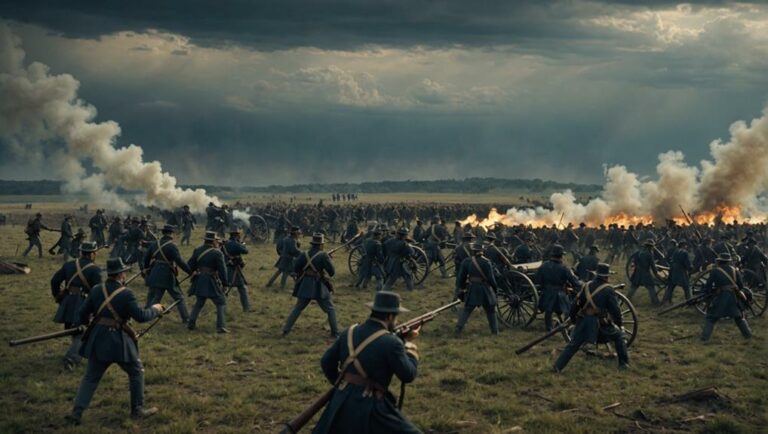The Battle of Gettysburg was a horrific testament to human suffering, with thousands of men and horses perishing and makeshift hospitals overwhelmed by the wounded.
Discover the grim realities and unseen struggles that challenge any romanticized views of this pivotal moment in history.
Monuments and Their Stories
Have you ever wondered about the stories behind the hundreds of monuments standing at Gettysburg? Each of these monuments stands as a tribute to the devotion and gallantry displayed during one of the most famous contests in American military history. They honor the sacrifices made by both Union and Confederate soldiers, preserving their memory for generations to come.
As you walk through Gettysburg, you'll notice that every monument carries a unique story. These stories reflect the individual acts of courage and determination that significantly shaped the battle's outcome. For example, the following day after a fierce clash, a particular monument might commemorate a regiment's brave stand or a decisive charge that turned the tide. These markers speak volumes about the bravery and resilience demonstrated by the forces on both sides.
The monuments at Gettysburg aren't just stone and metal; they embody the valor and dedication of the soldiers. They offer an in-depth glimpse into a pivotal moment in American history, reminding us of the personal sacrifices made. By exploring these stories, you gain a deeper understanding of the monumental efforts that defined the battle and the nation's history.
The Toll on Human Life
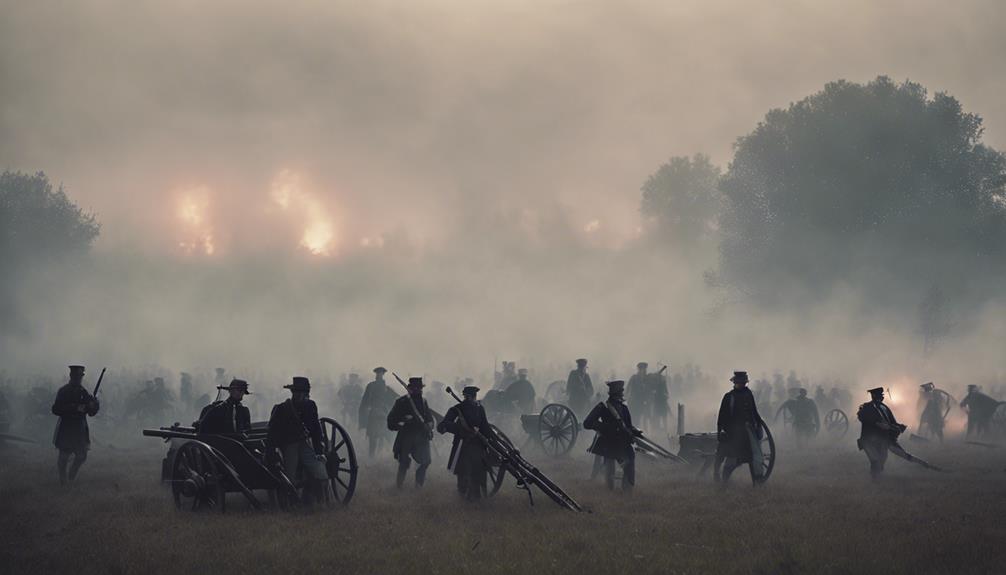
You can't ignore the devastating human suffering that resulted from the Battle of Gettysburg, with almost 6,000 men and over 10,000 horses killed.
The overwhelmed makeshift field hospitals struggled to care for the 36,000 wounded soldiers, leading to scenes of unimaginable agony.
Surgeons faced impossible choices, often leaving soldiers to wait for critical care in nearby woods.
Devastating Human Suffering
In the sweltering summer of 1863, over 36,000 grievously wounded soldiers inundated Gettysburg, overwhelming its already strained medical facilities and revealing the harrowing human cost of war.
From civilian perspectives, the scene was nightmarish. Townsfolk who'd never witnessed such brutality were suddenly thrust into a world of mangled bodies and constant cries of agony. The psychological trauma for those involved, both soldiers and civilians, was immense and lasting.
You'd see surgeons forced to make heart-wrenching decisions, prioritizing care based on who'd the best chances of survival. Many soldiers were left untreated, their suffering prolonged in the intense summer heat. Confederate soldiers, particularly, faced even harsher conditions, often transported in wagons without basic comforts or any semblance of medical attention.
The long-term consequences of this battle extended far beyond the immediate physical injuries. The mental scars left on survivors and witnesses challenged the romanticized notions of glory and honor in warfare. This brutal reality of war's toll on human life became a stark lesson for future generations, underscoring the profound, often overlooked impact of battle on the human psyche and community fabric.
Overwhelmed Medical Facilities
As the battle raged on, Gettysburg's already limited medical facilities were quickly overwhelmed, forcing surgeons to make impossible choices amid the chaos and bloodshed. Over 36,000 wounded soldiers flooded makeshift hospitals, where desperate conditions prevailed. With limited supplies and personnel, medical triage became a grim necessity. Surgeons had to prioritize who received urgent care, often making life-or-death decisions on the spot.
The scene was harrowing: rows of wounded soldiers lay in the woods, awaiting medical attention. These makeshift hospitals lacked adequate shelter, proper sanitation, and sufficient medical instruments. Witness accounts describe the relentless suffering and heartrending cries for help that echoed through the forest. The urgency and scale of the situation meant that many soldiers received only the most basic care, if any at all.
The aftermath of the Battle of Gettysburg starkly highlighted the devastating toll on human life brought on by overwhelmed medical facilities. The immense suffering and loss of life underscored the dire need for better preparedness and resources in times of such catastrophic conflict. This critical shortfall in medical infrastructure left a lasting impact on the soldiers and the history of military medicine.
Overwhelmed Medical Efforts
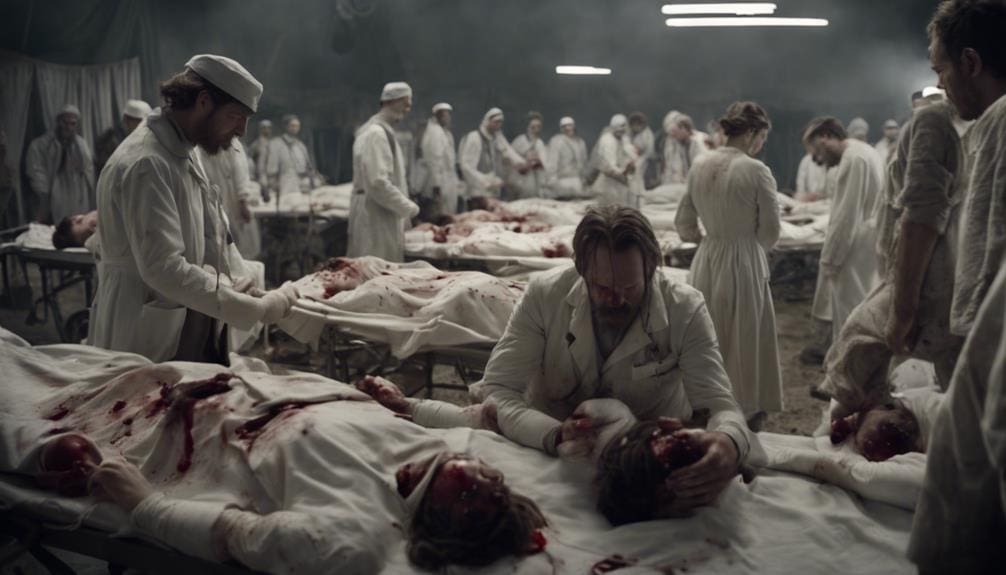
Overwhelmed by the sheer number of casualties, surgeons at Gettysburg faced the harrowing task of triaging soldiers based on their likelihood of survival. Overworked doctors struggled to manage the desperate conditions with inadequate supplies. The battle inundated makeshift field hospitals with 36,000 desperately wounded soldiers, pushing medical efforts to the brink.
You can imagine the gruesome scenes described by witnesses: rows of injured men lying in the nearby woods, awaiting any form of medical attention. These doctors had to make quick, heart-wrenching decisions about who could be saved and who'd be left to suffer. The sheer scale of injuries meant that many soldiers received only the most basic care, if any at all.
Medical facilities and personnel were severely overtaxed. Surgeons worked around the clock, often performing amputations without anesthesia. The lack of proper medical care led to unimaginable pain and suffering, exacerbating the trauma of battle. Supplies were so scarce that even basic necessities like bandages and antiseptics were in short supply.
The aftermath of Gettysburg revealed the staggering toll on human life and the immense challenges faced by those trying to save it.
Confederate Soldiers' Plight
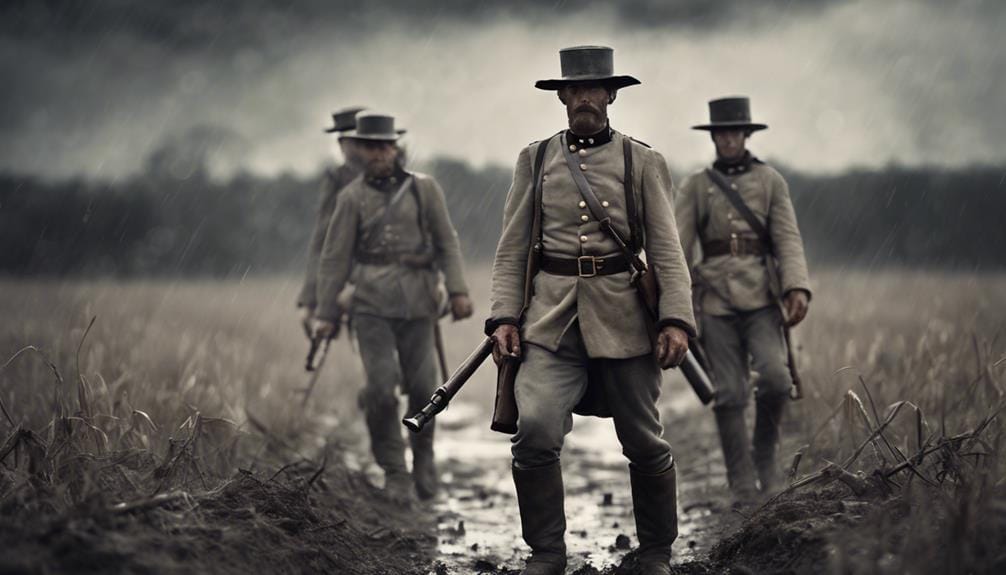
You can't fully grasp the extent of the Confederate soldiers' suffering without considering their harrowing transport conditions and minimal medical attention.
Mangled bodies were piled into wagons, with Colonel John D. Imboden witnessing first-hand the horrors during their journey.
Only a small percentage received medical care, leaving many to endure unimaginable pain and suffering.
Harrowing Transport Conditions
Colonel John D. Imboden watched in horror as mangled Confederate soldiers were piled into wagons devoid of basic comforts, highlighting the brutal conditions they endured during their transport from Gettysburg. The transportation horrors were laid bare through soldier testimonies, revealing a grim picture of a journey marked by immense pain and suffering. These wagons, lacking any semblance of comfort, became moving prisons for the wounded, amplifying their agony with every jolt and bump on the rough roads.
The lack of comfort and medical neglect was apparent. Many soldiers received no medical attention before being loaded onto these makeshift ambulances, which only exacerbated their already grievous wounds. The cries of the injured, begging for relief, echoed through the night, a haunting reminder of their forgotten suffering. Some accounts even describe soldiers' pleas for mercy, preferring death over the torment of their painful journeys.
This ordeal underscores the harsh realities faced by Confederate soldiers in the aftermath of the Battle of Gettysburg. The transport conditions not only highlighted the immediate physical suffering but also pointed to a broader neglect of basic human dignity and care in the face of overwhelming wartime challenges.
Minimal Medical Attention
The grim reality of the Confederate soldiers' plight at Gettysburg was starkly evident in the minimal medical attention they received, a situation exacerbated by the overwhelming number of casualties and scarce medical resources. You can only imagine the dire conditions they faced.
Wounded soldiers were piled into wagons without even the most basic comforts, like bedding or medical supplies. Colonel John D. Imboden witnessed these horrors firsthand, highlighting the severe medical neglect Confederate soldiers endured.
Only a small percentage of wounded soldiers received any form of medical care, leaving the majority to suffer without treatment. This inadequate care meant that many soldiers faced agonizing pain, not just from their injuries but also during painful transport over rough terrain. The wagons jostled and shook, exacerbating their suffering and compounding the already grim ordeal.
The ordeal of Confederate soldiers at Gettysburg sheds light on the harsh realities of war. The minimal medical attention available during the Civil War highlights a period of profound medical neglect and underscores the immense challenges faced by wounded soldiers. Understanding this context gives you a clearer picture of the brutal aftermath of one of the war's most pivotal battles.
Witness Accounts of Suffering
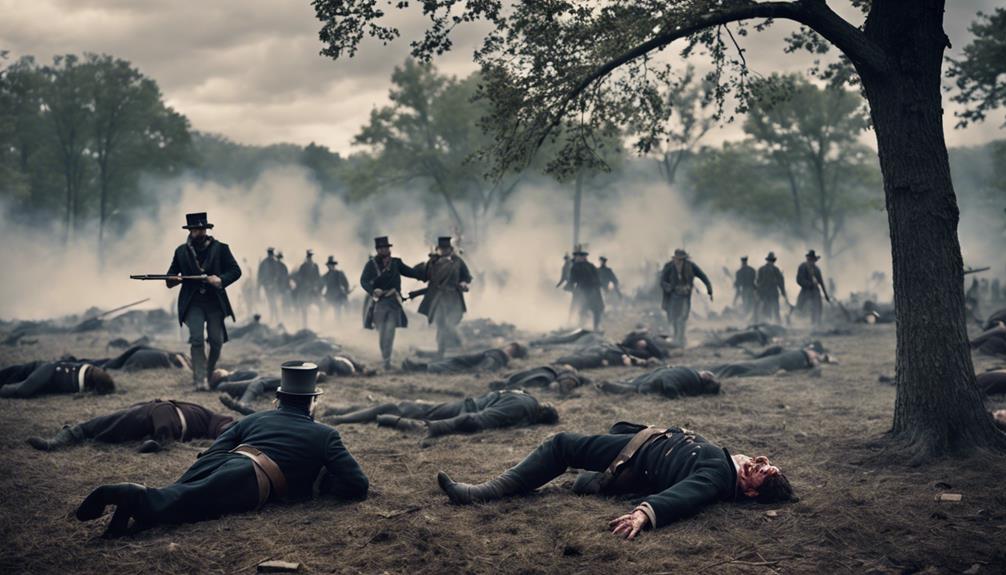
Amidst the chaos following the Battle of Gettysburg, witness accounts vividly describe the relentless suffering of 36,000 wounded soldiers flooding the town. Personal accounts from residents and field surgeons paint a harrowing picture of unimaginable pain and desperate conditions. The sheer number of injured overwhelmed the town's limited resources, forcing medical staff to make heart-wrenching decisions on who'd receive treatment.
Surgeons prioritized those with the best chances of survival, leaving many to endure their injuries untreated. Makeshift field hospitals, set up in churches, barns, and homes, were ill-equipped to handle the flood of wounded soldiers. Witnesses described seeing soldiers with shattered limbs, severe burns, and deep lacerations, all suffering without adequate medical care.
The surgeries performed were often brutal, with amputations conducted without anesthesia and rudimentary tools. Blood-soaked bandages and makeshift tourniquets were common sights. The accounts reveal a grim reality: many soldiers screamed in agony as they awaited their turn, knowing there was little hope for relief.
These personal accounts highlight the brutal consequences of the battle and illustrate the immense suffering that became part of Gettysburg's legacy. Understanding these experiences offers a sobering insight into the true cost of armed conflict.
Reflections on War's Reality
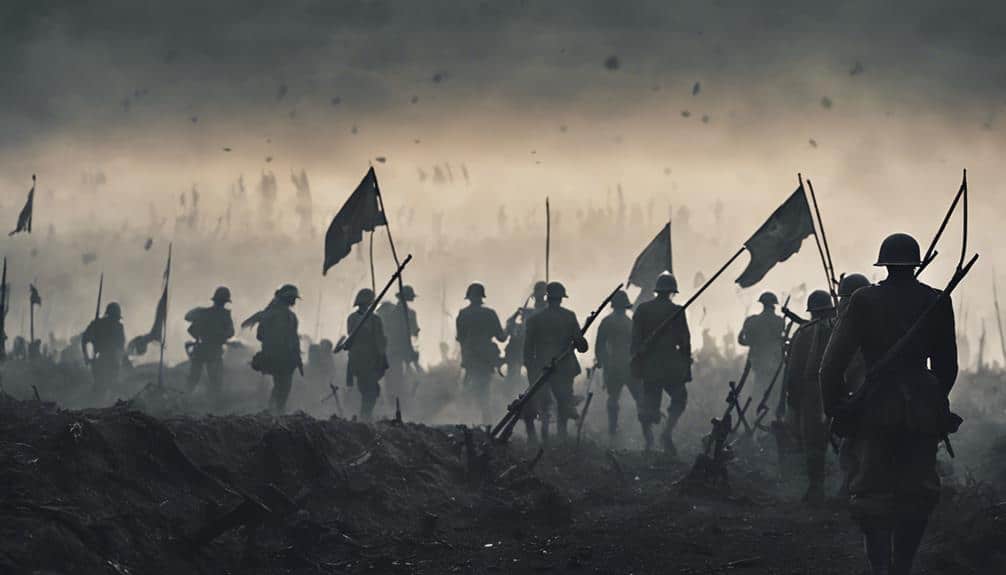
Reflecting on the harsh realities of war, witness accounts from Gettysburg strip away any romanticized illusions and expose the brutal human cost of conflict. Soldiers and medical personnel alike described the immense suffering, highlighting the true horrors beyond narratives of glory and honor. The psychological impact on those who survived was profound, with many enduring lasting trauma that haunted them for years.
The moral implications of the decisions made during battle presented ethical dilemmas that can't be ignored. How does one justify the immense loss of life for strategic gains? These questions force you to confront the darker aspects of human nature and the weighty responsibilities borne by military leaders.
Societal consequences extended beyond the battlefield. The collective trauma experienced by communities, who lost countless sons, fathers, and brothers, reverberated through generations. The aftermath of Gettysburg serves as a poignant reminder of war's devastating toll, challenging any romanticized notions you might hold.
In understanding the true cost of war, you're prompted to reflect on its lasting impacts—not just on those who fought, but on society as a whole, grappling with the collective pain and moral questions left in its wake.


